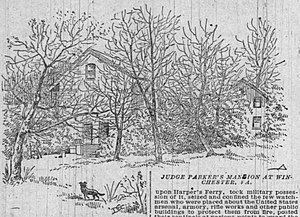Richard Parker (congressman)
Richard Parker | |
|---|---|
 | |
| Born | December 22, 1810 |
| Died | November 10, 1893 (aged 82) |
| Resting place | Mount Hebron Cemetery, Winchester |
| Alma mater | University of Virginia |
| Occupation | Lawyer, judge, politician |
| Known for | Presiding over John Brown's trial |
| Spouse(s) | Evalina Tucker Moss |
| Parent(s) |
|
Richard Parker (December 22, 1810 – November 10, 1893) was a nineteenth-century politician, lawyer, and judge from Virginia.
Biography[]
Born in Richmond, Virginia, son of Judge Richard E. Parker.[1] Parker studied law at the University of Virginia, and was admitted to the bar, commencing practice in Berryville, Virginia, near Winchester, where he lived. He was the paymaster at the Harpers Ferry Armory, and was also a slave owner.[2]:113 He owned ten human beings in 1859.[3]
He held several local offices before being elected as a Democrat to the United States House of Representatives in 1848, serving from 1849 to 1851. He was elected judge of the thirteenth judicial circuit of Virginia on January 15, 1851. In this capacity, Parker presided over the trials of John Brown and his associates in 1859, sentencing them to death for their raid on nearby Harpers Ferry. He published in 1888 his recollections of the trial.[4][5]

Parker left the court in 1869, when the Union Army occupying Virginia shut courts down, and resumed practicing law in Winchester, Virginia, until his death there on November 10, 1893. He was interred in Mount Hebron Cemetery in Winchester.
He married Evalina Tucker Moss, but they had no children.[1]
Parker's enslaved worker Presley Dunwood, who drove the carriage that took Judge Parker to court during John Brown's trial, published memoirs.[6]
References[]
- ^ Jump up to: a b "Death of Judge Richard Parker". Alexandria Gazette (Alexandria, Virginia). November 11, 1893. p. 2. Archived from the original on July 20, 2021. Retrieved July 20, 2021 – via newspapers.com.
- ^ Meyer, Eugene L. (2018). Five for Freedom. The African American Soldiers in John Brown's Army. Chicago: Lawrence Hill Books (Chicago Review Press). ISBN 9781613735725.
- ^ Lubet, Steven (2012). John Brown's Spy. The Adventurous Life and Tragic Confession of John E. Cook. New Haven, Connecticut: Yale University Press. p. 128. ISBN 9780300180497.
- ^ Parker, Richard (April 8, 1888). "The Trial of John Brown. Its Secret History Recealed for the First Time by the Judge". St. Louis Globe-Democrat (St. Louis, Missouri). p. 26. Archived from the original on June 14, 2021. Retrieved July 20, 2021 – via newspapers.com.
- ^ Parker, Richard (April 8, 1888). "The Trial of John Brown. Its Secret History Recealed for the First Time by the Judge (pt. 2)". St. Louis Globe-Democrat (St. Louis, Missouri). p. 27. Archived from the original on May 25, 2021. Retrieved July 20, 2021 – via newspapers.com.
- ^ "Life Struggles of an Ex-Slave. Civil War scenes recalled by Presley Dunwood. At trial of John Brown". (Denver, Colorado). August 1, 1914. p. 7. Archived from the original on July 20, 2021. Retrieved July 20, 2021 – via newspapers.com.
External links[]
- United States Congress. "Richard Parker (id: P000068)". Biographical Directory of the United States Congress.
- Richard Parker at Find a Grave
- Stoddert Family papers trace their roots to Richard Parker, found at the University of Maryland Libraries
![]() This article incorporates public domain material from the Biographical Directory of the United States Congress website http://bioguide.congress.gov.
This article incorporates public domain material from the Biographical Directory of the United States Congress website http://bioguide.congress.gov.
- 1810 births
- 1893 deaths
- Members of the United States House of Representatives from Virginia
- Virginia lawyers
- Virginia state court judges
- Politicians from Richmond, Virginia
- Politicians from Winchester, Virginia
- Virginia Democrats
- Democratic Party members of the United States House of Representatives
- 19th-century American politicians
- People from Berryville, Virginia
- John Brown's raid on Harpers Ferry
- American slave owners
- Burials at Mount Hebron Cemetery (Winchester, Virginia)
